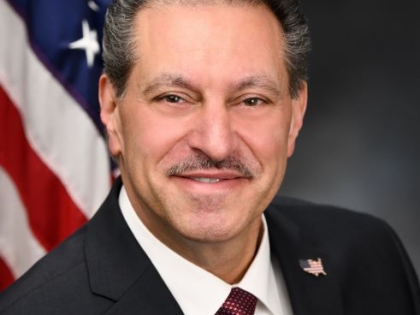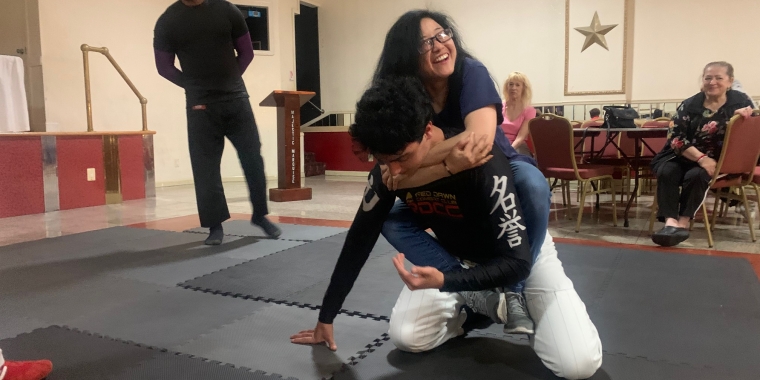
Addabbo Hosts Zoom Discussion Regarding Problem Gambling and Gambling Disorder; Introduces Important New Gambling Legislation
March 18, 2024
In observance of March as Problem Gambling Awareness Month and March 12th as Gambling Disorder Screening Day, Senator Joseph P. Addabbo, Jr. hosted a virtual discussion via Zoom on March 12, 2024, to educate the public on problem gambling, provide information on available support services, and foster connections with organizations that can help.
Many people attended the event from across the country to hear the information provided by speakers from New York Council on Problem Gambling, Resorts World NYC Casino, Problem Gambling Recovery Advocate Carmine Vetrano, and keynote speaker Professor David Nutt, Director of the Neuropsychopharmacology Unit in the Division of Brain Sciences at the Imperial College of London, and one of the world’s leading experts on addiction.
The topics of discussion included the signs and symptoms of gambling addiction, how addiction affects different parts of the brain, voluntary self-exclusion, screening for gambling disorder, addressing the national theme of Problem Gambling Awareness Month, which is “Every Story Matters,” and the New York State theme, which is S.E.E. It – Support, Educate, and Engage to Reduce Gambling Harm.
As the Chairman of the Senate’s Committee on Racing, Gaming, and Wagering, Senator Addabbo understands the positive revenue impact of gambling but is also aware of the unintended consequences it can bring. He is committed to addressing these issues by increasing funding for problem gambling programs.
“For some, gaming is a casual means of entertainment, but for others it becomes all-consuming, and we need to help them,” Addabbo said. “As the Chairman of the NYS Senate Committee on Racing, Gaming and Wagering, I believe I have a responsibility to bring this event to the community for the public good and will always consider the issue of problem gambling a high priority when safely expanding gaming in New York. If we can help individuals from taking this preventable trip down the road to self-destruction, especially through early detection, then we have accomplished something important.”
Recently, he introduced legislation to ensure that problem gambling program funding is at least 1% of tax revenue of mobile sports betting or $6 million, whichever is greater. Additionally, this month, Senator Addabbo’s committee passed three bills related to problem gambling during Problem Gambling Awareness Month. These bills include requirements for gambling advertisements to include warnings about addiction, expanding the prohibition of individuals under 21 from gambling, and directing the gaming commission to regulate predatory sportsbook bonuses in mobile sports betting.
Michelle Hadden, the Assistant Executive Director, Program, New York Council on Problem Gambling said most people who gamble do not develop an addiction and while there are certain high-risk groups, gambling addiction can affect anyone of any age or race. Gambling goes from being a fun pastime to an addiction or a disorder when it causes harms such as lying, chasing losses, dedicating more time and energy to gambling, along with a reduction in time spent with family members or at work, or being involved in other activities people used to enjoy participating in. Many addicts borrow money, lose time from school or work, and use gambling to cope with other issues that they are having in their life.
“This is a significant problem as 600,000 New Yorkers are struggling with a gambling problem,” Hadden said. “We are here to help.”
Professor David Nutt who is an addiction expert, studying many differ types of addition throughout his career, and has been researching gambling addiction for 15 years explained how gambling affects the brain.
“I am delighted to have this opportunity to share our research on the brain mechanisms underpinning gambling addiction as they will help explain why it is so hard to break its grip and hopefully lead to new treatments,” Professor Nutt said.
He agreed with Hadden’s point that once people become addicted to gambling, they lose interest in things that once gave them pleasure like food, family and friends, sports and the like. Nutt used brain imaging techniques to prove this theory. The scans showed that when addicts watched gambling videos like a game of roulette there was “a massive activation of the brain,” with sections lighting up in red and yellow signifying “hot” meaning increased activity in the brain. Meanwhile other videos of activities that non-addicted people would find pleasurable generated no interest or no response.
Nutt explained that in a non-addicted brain there are four key circuits which regulate behavior – an emotional circuit, a reward circuit, top-down control circuit; where you make decisions about yourself, and the pre-frontal cortex which regulates thoughts, actions, and emotions. In the addicted brain, the emotional system and reward system become hyperactive, and those two systems dominate the control systems so the ability of your frontal cortex to say no becomes stimulated and people can no longer say no, they have to gamble when they get the urge to gamble.
2 million adults in the U.S. meet severe gambling criteria each year, according to the National Council on Problem Gaming and another 4 to 6 million American adults have mild or moderate problems. 4.3% of adult residents in New York State are experiencing problems related to their gambling activity (over 600,000 adults), according to the NYCPG.
Carmine Vetrano, a recovering gambling addict, shared his story in hopes of helping others. He is an active member of Gambler’s Anonymous and has not bet in 3 years 3 months and 9 days. He explained how he went from betting small amounts of money to emptying his 401k, maxing out credit cards and stealing from family members. His interest in sports betting was triggered by his time playing hockey in college. However, his enjoyment of playing hockey and watching sports turned into an addiction that nearly destroyed his family and his life. “I was on an elevator going to the bottom. It’s important to me not to lose sight of that. That’s something we talk about in recovery, you don’t want to live in the past, but obviously being able to glance in that rear view mirror helps every once in a while, it reminds me of how dangerous it really could be.”
To report a possible problem gambling issue, individuals should call 877-8-HOPENY (877-846-7369) or go to the New York Office of Addiction Services and Support website at OASAS.NY.GOV
